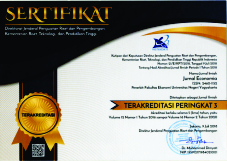Mapping of Internal Audit Quality on the Public Sector in Indonesia: A Systematic Review
Downloads
This study aims to explore internal audit quality in Indonesia, especially in the public sector. The researcher used a systematic literature review method to synthesize the research results conducted over the past seven years between 2016 and 2022. This study found that most internal audit quality is only output-oriented, primarily influenced by compliance driver variables. The most researched variables are independence and competence. It also adopts attribution theory. However, the kaizen philosophy perspective assesses quality based on the demand-based driver. Finally, this study proposes a conceptual model for developing internal audit quality and future research that should be conducted based on outcomes using a qualitative approach.
Downloads
ACFE Indonesia Chapter. (2020). Survei Fraud Indoneia. https://acfe-indonesia.or.id/wp-content/uploads/2021/02/SURVEI-FRAUD-INDONESIA-2019.pdf
Anderson, U. L., Head, M. J., Ramamoorti, S., Riddle, C., Salasick, M., & Sobel, P. J. (2017). Internal Auditing: Assurance & Advisory Services (4th ed.). Internal Audit Foundation.
Arigawati, D. (2019). Hubungan Penerapan Supervisi Audit Dengan Kualitas Laporan Audit Internal Pada Bpk-Ri, Jakarta. Jurnal Akuntansi Bisnis, 12(2), 95–106. https://doi.org/10.30813/jab.v12i2.1771
Birnberg, J. G., Luft, J., & Shields, M. D. (2006). Psychology Theory in Management Accounting Research. Handbooks of Management Accounting Research, 1(06), 113–135. https://doi.org/10.1016/S1751-3243(06)01004-2
Buchheim, L., Krieger, A., & Arndt, S. (2020). Innovation types in public sector organizations: a systematic review of the literature. Management Review Quarterly, 70(4), 509–533. https://doi.org/10.1007/s11301-019-00174-5
Denyer, D., & Tranfield, D. (2009). Producing a Systematic Review. In The SAGE Handbook of Organizational Research Methods (pp. 671–689).
Erlina, & Muda, I. (2018). The effect of self efficacy and professional development on the work quality of internal auditor. International Journal of Civil Engineering and Technology, 9(5), 1292–1304.
Gramling, A. a, & Vandervelde, S. D. (2006). Assessing Internal Audit Quality. Internal Auditing, 21(3), 26-30,32-33. http://search.proquest.com/docview/214393978?accountid=13552%5Cnhttp://findit.lib.rmit.edu.au:9003/sfx_local??genre=article&sid=ProQ:&atitle=ASSESSING INTERNAL AUDIT QUALITY&title=Internal Auditing&issn=0897-0378&date=2006-05-01&vo
Hawkes, L. C., & Adams, M. B. (1994). The Total Quality Management Revolution. Managerial Auditi, 9(4), 11–18.
Hawkes, L. C., & Adams, M. B. (1995). Total quality management and the internal audit: Empirical evidence. Managerial Auditing Journal, 10(1), 31–36. https://doi.org/10.1108/02686909510077361
Hazaea, S. A., Zhu, J., Al-Matari, E. M., Senan, N. A. M., Khatib, S. F. A., & Ullah, S. (2021). Mapping of internal audit research in China: A systematic literature review and future research agenda. Cogent Business and Management, 8(1). https://doi.org/10.1080/23311975.2021.1938351
Heider, F. (1958). The psychology of interpersonal relations. John Wiley & Sons, Inc.
Ibrani, E. Y., Faisal, F., Sukasari, N., & Handayani, Y. D. (2020). Determinants and Consequences of Internal Auditor Quality on Regional Government Performance. Quality-Access to Success, 176(21), 87–92.
Kai, R., Yusheng, K., Ntarmah, A. H., & Ti, C. (2022). Constructing internal audit quality evaluation index: evidence from listed companies in Jiangsu province, China. Heliyon, 8(9), e10598. https://doi.org/10.1016/j.heliyon.2022.e10598
Kiswara, D. E., Iswajuni, I., Handayani, C., & Soetedjo, S. (2018). Meta Analisis: Faktor-Faktor Yang Mempengaruhi Kualitas Audit Pada Aparat Pengawasan Internal Pemerintah (Apip) Di Indonesia. JURNAL AKUNTANSI, EKONOMI Dan MANAJEMEN BISNIS, 6(1), 54–66. https://doi.org/10.30871/jaemb.v6i1.811
Lowensohn, S., Johnson, L. E., Elder, R. J., & Davies, S. P. (2007). Auditor specialization, perceived audit quality, and audit fees in the local government audit market. Journal of Accounting and Public Policy, 26(6), 705–732. https://doi.org/10.1016/j.jaccpubpol.2007.10.004
Mahadewi, I. G. A. C., & Dwirandra, A. A. N. B. (2022). Faktor Internal dan Eksternal yang Memengaruhi Kualitas Audit. E-Jurnal Akuntansi, 32(6), 1591. https://doi.org/10.24843/eja.2022.v32.i06.p15
Mu, R., & Wang, H. (2020). A systematic literature review of open innovation in the public sector: comparing barriers and governance strategies of digital and non-digital open innovation. Public Management Review. https://doi.org/10.1080/14719037.2020.1838787
Nerantzidis, M., Pazarskis, M., Drogalas, G., & Galanis, S. (2022). Internal auditing in the public sector: a systematic literature review and future research agenda. Journal of Public Budgeting, Accounting and Financial Management, 34(2), 189–209. https://doi.org/10.1108/JPBAFM-02-2020-0015
Nurdiono, & Gamayuni, R. R. (2018). The effect of internal auditor competency on internal audit quality and its implication on the accountability of local government. European Research Studies Journal, 21(4), 426–434. https://doi.org/10.35808/ersj/1132
Petticrew, M., & Roberts, H. (2006). Systematic Reviews in the Social Sciences: A Practical Guide. In Systematic Reviews in the Social Sciences (1st ed.). Blackwell Publishing. https://doi.org/10.1002/9780470754887
Pitt, S.-A. (2014). Internal Audit Quality: developing a quality assurance and improvement program (1st ed.). John Wiley & Sons, Inc. https://doi.org/10.1002/9781118777213
Polizzi, S., Lupo, F., & Testella, S. (2022). Quality assurance and improvement program : some considerations for central banks. The TQM Journal, 1754–2731. https://doi.org/10.1108/TQM-05-2021-0128
Pratomo, D. (2016). Pengaruh Kompetensi,Kompleksitas Tugas, dan Tekanan Anggaran Waktu Terhadap Kualitas Audit. Jurnal Akuntansi Dan Bisnis, 16(2), 123–133. www.jab.fe.uns.ac.id
Sari, L. D. P., & Tri, W. (2018). Expectation Gap pada Persepsi Auditor Internal dengan Auditee terkait Kompetensi, Independensi, dan Kualitas Audit. Jurnal Riset Akuntansi & Perpajakan (JRAP), 5(01), 53–64. https://doi.org/10.35838/jrap.v5i01.172
Sukesi, S. (2019). Pengaruh Kompetensi, Independesi, Pengalaman Audit Aparat Pengawasan Intern Pemerintah Terhadap Kualitas Audit Internal Dengan Etika Sebagai Variabel Moderasi Pada Inspektorat Jenderal di Tentara Nasional Indonesia. Jurnal Magister Akuntansi Trisakti, 6(1), 95–120.
Surya, G. (2021). Deretan Kasus Korupsi Terbesar di Indonesia, Negara Rugi Puluhan Triliun. https://www.kompas.tv/article/204569/deretan-kasus-korupsi-terbesar-di-indonesia-negara-rugi-puluhan-triliun
Susanti, W. (2019). Persepsi Auditor Tentang Faktor Faktor Yang Mempengaruhi Kualitas Audit Internal. Jurnal Ilmiah Ekonomi Bisnis, 24(2), 122–135. https://doi.org/10.35760/eb.2019.v24i2.1905
Taman, A., Wijayanto, P. A., & Rachmawati, E. (2018). Kualitas Audit Auditor Internal Pemerintah: Kompetensi, Independensi Dan Profesionalisme. JURNAL AKUNTANSI, EKONOMI Dan MANAJEMEN BISNIS, 6(1), 74–83. https://doi.org/10.30871/jaemb.v6i1.813
The Institute of Internal Auditors. (2017). International Standards for the Professional Practice of Internal Auditing (Standards) (Issue October 2016). https://www.iia.org.au/sf_docs/default-source/quality/ippf-standards-2017.pdf?sfvrsn=2















